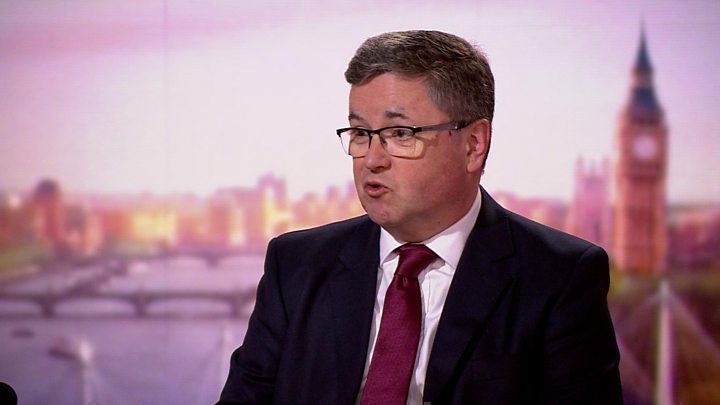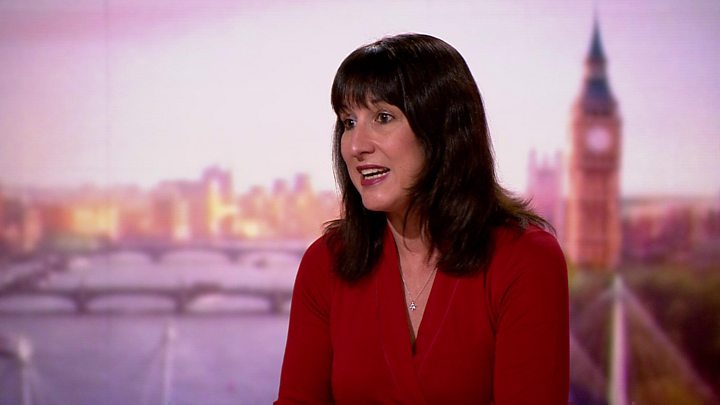Brexit: Buckland says power to override Withdrawal Agreement is 'insurance policy'

Justice Secretary Robert Buckland has defended plans to potentially override the EU Withdrawal Agreement as an emergency Brexit "insurance policy".
He told the BBC he hoped powers being sought by ministers in the Internal Markets Bill would never be needed, as a solution could be found with the EU.
He said he would resign if the UK ended up breaking international law "in a way I find unacceptable".
But he made clear he did "not believe we will get to that stage".
Labour have indicated they will not support the proposed legislation - which MPs will debate for the first time on Monday - unless major changes are made to it.
Pressure is mounting on those Conservative MPs who are sceptical about the legislation to oppose it in the Commons as well, with former prime ministers Tony Blair and Sir John Major calling it "shaming and embarrassing".
The EU's chief negotiator, Michel Barnier, said the EU could not have been "clearer" when the two sides agreed the Brexit withdrawal agreement last year what the implications would be for Northern Ireland and the rest of the UK.
And Irish foreign affairs minister Simon Coveney said it was "completely bogus" for the UK to claim that the EU was now interpreting the Withdrawal Agreement in a way which could led to the break-up of the UK.
Boris Johnson says the European Union is threatening to impose a customs border in the Irish Sea, separating Northern Ireland from the rest of the UK.
If the Internal Markets Bill becomes law, it will give UK ministers powers to modify or "disapply" rules relating to the movement of goods between Britain and Northern Ireland and subsidies for Northern Irish companies. These rules are due to come into force from 1 January unless the UK and EU are able to strike a trade deal before then.
The proposed new legislation would change the terms of the so-called Northern Ireland Protocol, a crucial part of the legally-binding Withdrawal Agreement drawn up and agreed by both sides prior to the UK's exit from the EU on 31 January.
'Break the glass in an emergency'
Appearing on the BBC's Andrew Marr, Mr Buckland said the government would only invoke the powers in the Bill if other solutions couldn't be reached and if the EU went on to act in an "unreasonable" way by insisting on excessive checks on goods moving across the Irish Sea.

"I believe with our determination to seek an agreement, we will get a position where we don't need to invoke these provisions. This is all about insurance planning, if you like, a break-the-glass-in-an-emergency provision".
He acknowledged there was a "dichotomy" between the UK's positions in domestic and international law but insisted he believed these would be resolved.
Pressed on whether he would quit if the UK did end up breaking international law, he replied: "If I see the rule of law being broken in a way which I find unacceptable, then of course I will go. We are not at that stage."
He added: "I don't believe we will get to that stage. I know in my mind what we have to do.
"The government collectively also has a responsibility. We have to resolve any conflict and that is what we will do."
Food exports
But Mr Coveney said the UK would be "reneging" on legally-binding commitments if the bill passed and rejected claims the Withdrawal Agreement was a threat to its territorial integrity and the Northern Irish peace process.
"How then can the EU proceed with these negotiations and put a new agreement in place, which will be the basis for a new relationship, if existing agreements, which aren't even a year old, are being legislated against?" he said.
And Mr Barnier said suggestions the EU was threatening to effectively block UK food exports to the continent by withholding a "third country" licence to sell products of animal origin was not true.
Although the government has a comfortable majority of 80 in the House of Commons, it is facing a rebellion from Tory backbenchers over the Internal Markets Bill, and its passage through the Lords is far from guaranteed.
Labour's Brexit spokeswoman, Rachel Reeves, told the BBC the party could not support the bill "as it stands" because it would be "deliberately and consciously breaking international law".
She told the Andrew Marr programme it would be "counter-productive" to the UK trying to achieve a free trade agreement with the EU and others around the world.
And the Liberal Democrats said adherence to the rule of law appeared to have become "optional" for ministers.
"Robert Buckland swore an oath to respect the rule of law. It is utterly appalling to see him shrug his shoulders like this when the Conservative government is preparing to break it," said their justice spokeswoman, Wera Hobhouse.